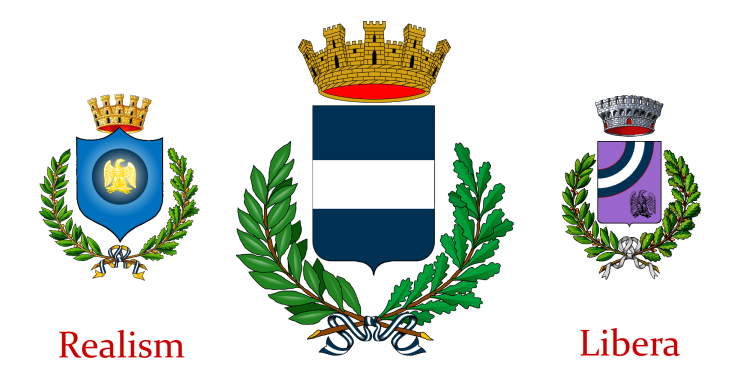Sandum political theories represent a systematic set of beliefs that the Central People’s Government of Sandus follows when making political decisions. Whereas the Sandum Philosophy is a sociocultural system of beliefs, the political theories represent three commonly-held beliefs of the Sandum government. These are Libera, Realism, and Philia, and they are often considered a subset of the Sandum Philosophy’s Sancta category. Like the Sandum Philosophy, these beliefs were either created or became predominant under the reign of the Sôgmô and the present regime of the State of Sandus. Libera was created as a system of beliefs in May 2010 as a response to a need to safeguard Sandum independence during the hegemony of the Democratic People’s Republic of Erusia at that time. Realism has been developed since February 2012, when the reigning Sôgmô published the first Realist treatise. Philia is the most recent addition and has been seen as the “child” policy of both Libera and Realism when it was established in Autumn 2012.
Libera
Libera is a political theory in Sandus whose name means “freedom” in both Sancta, Sandus’s constructed language for cultural development, and Latin. This political theory dates to the time in the Spring and Summer of 2010 when Sandus was a close ally of the Democratic People’s Republic of Sandus – then a leading state in the intermicronational community. Since the Foundation of the State of Sandus on 13 April 2011, Libera has been a policy for the continuation of Sandum independence and sovereignty, instead of keeping Sandus independent of a leading hegemon in the international system. The premise of Libera is that Sandus will be a better state and will advance the Sandum People’s welfare if the state remains independent. Libera specifies that Sandus must:
- Independence: Remain independent and sovereign in its affairs.
- Self-Reliance: Work towards self-reliance in all fields of economic, politics, and society.
- Self-Defence: Defend itself from political attacks against the State of Sandus and its policies; since Nov. 2012, however, this requirement has been relaxed and has led to an era known as the Pax Sande.
Realism
Realism is a political theory in Sandus that has its roots in Sandum efforts for “seriousness and professionalism” dating from early reign of the State of Sandus in 2011. When the Sôgmô published the first Realist treatise the Fire of the Central Hearth on the occasion of the first anniversary of the Secession of Sandus from St.Charlie, Realism was established as an ideology and a perspective within micropatriological studies (the study of micronations). The focus of Realism is on a specific set of micronations known as secessionist micronations — both of the passive and active variety. By viewing micronations with a lens that all micronations are like all states – self-manifested social constructs – and that “seriousness” and “professionalism” in one’s state can benefit the entire nation-project, this political theory seeks to have Sandus recognise its realistic or pragmatic potential as a state for meeting its ends. Realism seeks to find and develop an understanding of how micronational states can better themselves and serve their populations in the best way; Sandum Realism is of course interested in understanding how Sandus can better its vision and the work done as a state for that vision, as set by the Sandum Philosophy. The basic tenet of Realism is for Sandus to develop itself as a state in accomplishing the visionary goals written into the Sandum Philosophy through pragmatic means; in other words, the vision of Sandus established by the Philosophy is necessary for the political theory of pragmatism expressed in Realism.
Philia
Philia is the most recent political theory in Sandus, having been established in the Autumn of 2012. The premise of Philia is that the development of a wholly Sandum culture will lead to cultural independence for Sandus as a nation-state. The focus of Philia is on the development of Sandum culture and creation of a Sandum identity for citizens. Seen as the political child of both Libera and Realism, Philia has its conception in the history of the Soaring Glaucus of the Sovereign People movement that sought to apply a sociological understanding of culture and society to Sandus. The First Philia Advance in Autumn 2012 saw the rise of a focus on the Sandum Value and the proclamation of the Sandum Identity, where Sandum arts were stressed. During the First Philia Advance, Sandus developed the Sandum Minecraft Server for the Philia Advance, a former project of the Sandum government for developing a wholly Sandum virtual city in theory, and aired its first musical “concert” with rewritten lyrics for the Secession of 2013. For the Second Philia Advance of Autumn 2013, Sandus developed the leitourgía and liaison programs (see Policies, Programs, and Projects of the State). Each “Advance” happens during Autumn due to the cultural celebration of the Armilustrium, which marks Sandus’s borders “closing” and diplomacy becoming less prominent; as a result, the Sandum People turn “inward” and focus on Sandum-specific issues.
Each of the three political theories in Sandus works with the others and all three are the political manifestation of the Sandum Philosophy’s Sancta category.


Leave a comment